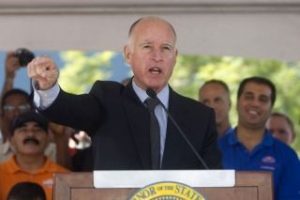In a move that will shrink the state’s environmental footprint and save millions of taxpayer dollars, Governor Jerry Brown issued a sweeping executive order directing agencies and departments to take immediate steps to green the state’s buildings, reduce greenhouse gas emissions and improve energy efficiency.
Brown was Tuesday’s KVML “Newsmaker of the Day”.
“Doing something real about the growing threat of global warming requires more than just new laws. We must lead by example,” said Governor Brown. “Greening the state’s buildings will shrink our environmental footprint and save taxpayers millions of dollars.”
The executive order calls for new or renovated state buildings larger than 10,000 square feet to achieve the U.S. Green Building Council’s LEED “Silver” certification or higher and to incorporate clean, on-site power generation, such as solar photovoltaic, solar thermal and wind power generation and clean back-up power supplies.
The order also sets a target of zero net energy consumption for 50% of the square footage of existing state-owned buildings by 2025 and zero net energy consumption from all new or renovated state buildings beginning design after 2025.
Additionally, the executive order directs state agencies and departments to:
• Reduce greenhouse gas emissions by 10% by 2015 and 20% by 2020, as measured against a 2010 baseline;
• Reduce overall water use by 10% by 2015 and 20% by 2020, as measured against a 2010 baseline; and
• Reduce grid-based energy purchases and other non-building, grid-based retail energy purchases by 20% by 2018, as compared to a 2003 baseline.
Under the directive, state agencies and departments will also purchase and use environmentally preferable products and provide electric vehicle charging stations at employee parking facilities in new and existing buildings.
These measures could save taxpayers millions of dollars. For example, reducing state energy purchases by 20% by 2018 could save $45 million per year and reducing water use by 20% by 2020 could save $7 million per year and a billion gallons of water.
As a result of California’s efficiency policies, the state’s per capita use of electricity has remained virtually flat over the past 30 years, despite rapid economic growth. Since 1978, these policies have created 1.5 million jobs and saved Californians more than $1,000 per household.
California is home to more LEED certified buildings than any other state, with twice as many as the next state, Texas.
The KVML “Newsmaker of the Day” is heard each weekday morning on AM 1450 KVML at 6:47, 7:47 and 8:47am.


